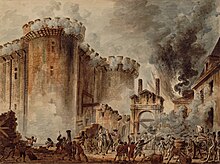

In the 19th century there was a wave of nationalism in the European continent which rejuvenated the European countries. Newly created countries like Germany, Italy, Romania were made up of several regional states whose national identity was 'common'. Others like Greece, Poland, Bulgaria became independent nations. The rise of nationalist consciousness had started in Europe from the Renaissance period, but it took a strong form in the French Revolution of 1789 AD.
In the 18th century, many countries such as Germany, Italy and Switzerland were not as we see them today. By the middle of the eighteenth century, Germany, Italy and Switzerland were divided into monarchies, dioceses and cantons, whose rulers had autonomous territories. Similarly, Eastern and Central Europe were under autocratic monarchies and different types of people lived in these regions. They did not consider themselves to be part of a common identity or any 'common culture'. Such a situation was not easy to promote political unity. The only factor that bound these types of groups together was allegiance to the emperor.
Before the French Revolution, France was a state whose entire territory was ruled by an autocratic king. The slogan of the French Revolution 'Freedom, Equality and Universal Fraternity' took politics out of the elitist environment and made it the object of newspapers, the streets and the general public. By the end of the 19th century, the results proved to be significant. Napoleon's Code - It came into force in 1804. It abolished the privileges based on birth. It not only established equality before justice but also protected the right to property.
Napoleonic wars in the last years of the 18th century contributed significantly to the spread of nationalism in Europe. In Italy, Poland, Germany and Spain, it was Napoleon who carried the message of 'New Age'. It opened a new chapter in Italy and Germany. He established an organized and uniform government in the whole country which resulted in rise of the ideas of nationalism there. This feeling of nationalism took Germany and Italy out of the limits of mere geographical expression and gave it a real and political form, which paved the way for the Unification of Italy and Germany.
Main Events
1789 AD - French Revolution
1804–15 - Serbian Revolution against the Ottoman Empire
1814 - Norway's attempt for independence against Denmark-Norway
1815 - Congress of Vienna
1821-32 - Greek War of Independence
1830-31 - Belgian Revolution
1830-31 - Uprising in Polish-Lithuania
1846 - Greater Poland Uprising
1848 - Nationalist uprising in Hungary, Italy, Germany
1859-61 - Unification of Italy
1863 - National uprising of Poland
1866-71 - Unification of Germany
1867 - Hungary was granted greater autonomy
1867 - Rise of the Nationalism Fenian in Ireland
1878 - Berlin Congress: Serbia, Romania and Montenegro gained independence from the Ottoman Empire.
1908 - Bulgaria became indepedent
1912 - National awakening and independence of Albania [1]
1916 - Irish Republican Brotherhood & Volunteers, Easter Rising
1923 - Turkish War of Independence, which resulted the end of the monarchy in 1922, led to establishment of the Turkish Republic in 1923.

Outcomes
(1) The development of the feeling of nationalism in Europe led to the integration of European states. This led to the rise of many large and small nations.
(2) It was the result of European nationalism that 'narrow nationalism' was born in the late 19th century. Due to narrow nationalism in people and rulers, they felt nationalism for their nation. For this they were ready to go to any extent. This sentiment started gaining momentum in the small states and various ethnic groups of the Balkan region as well.
(3) Imperialist tendencies emerged in countries like Germany, Italy due to the influence of European nationalism. This trend targeted Asian and African countries where European countries established their colonies. The foundation of the Industrial Revolution rested on the exploitation of these colonies. This imperialist tendency led to the fall of the Ottoman Empire.
(4) European nationalism also had an impact on Africa and the Asian colonies. Freedom movements started in these colonies for freedom from foreign rule.
References
-
^
"Archived copy". Archived from
the original on 12 October 2014. Retrieved 22 January 2022.
{{ cite web}}: CS1 maint: archived copy as title ( link)